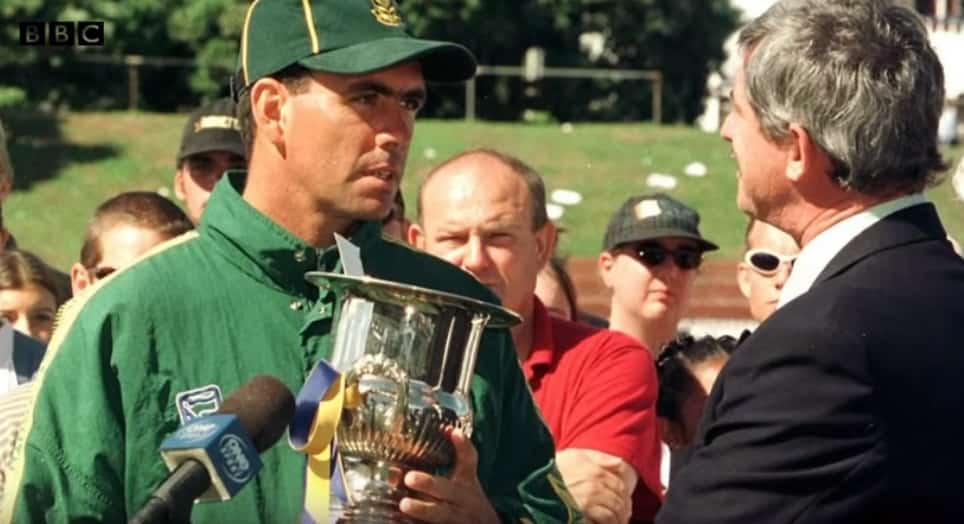Hansie Cronje was hailed as one of the more innovative captains in cricket and at the time it happened, the 2000 Test match between South Africa and England looked to have become another example of this. Alas, it was just a portent to the ugly side of cricket.
Only months before Cronje was accused of fixing matches with a betting syndicate by Delhi police, he was hailed as one of the best captains in the world.
Not just that, Cronje was also known to be one of the most upright and honest cricketers in the world with his integrity having never been in doubt.
Which is also why what happened at Centurion – and in some other matches involving South Africa under Cronje – shook the world of cricket no end.
So what exactly went down in the Centurion Test?
The 2000 Centurion Test between South Africa and England
At the time it happened, the 2000 Centurion Test, which was the fifth of the series, gained prominence for setting the right precedence for how captains needed to play cricket.
At the time, in fact, this match was lauded as one of the most remarkable and positive matches in cricket history, particularly due to the spirit of sportsmanship and fair play displayed by the two captains, Hansie Cronje and England’s Nasser Hussain.
Also Read:
The background to the 2000 Centurion Test
South Africa had won the first Test of the series by an innings and 21 runs thanks to an 11-wicket haul for Allan Donald. The next two matches at Port Elizabeth and Durban ended in draws before South Africa registered another innings victory in the fourth Test at Cape Town.
With the series won as a result of those two victories, South Africa and England went into the fifth and the final game that had also become inconsequential as a result.
This fifth Test was to be played at Centurion.
What happened on days one to four in Centurion?
South Africa were inserted into bat on day one of this game but rain allowed only 45 overs to be bowled. In that stipulated time, South Africa slumped to 155/6 with Lance Klusener and Shaun Pollock at the crease.
Three days of rain in Centurion meant that going into the final day of the Test, not even one innings had been completed.
What happened on day five of the game?
A draw looked like a foregone conclusion when a suggestion made by the South African skipper seemed to have changed the landscape of cricket.
Cronje asked England wicket-keeper Alec Stewart if he could send Hussain a proposal.
A proposal to make a match of it, as he agreed to declare his team’s first innings and forfeit the second innings. England, on their part, needed to declare their first innings at 0/0, thereby getting set a pre-decided target in their fourth innings in a set number of overs.
At first Hussain declined to do so, saying:
“I said to Alec – ‘no, tell Hansie this isn’t county cricket, it’s a Test match’. Also we were 2-0 down and I didn’t want to go 3-0 down!”
Later, when Hussain found that the pitch was easy to bat on, he quickly came around. Cronje had originally suggested a target of 270 from 73 overs but Hussain asked for 250 in what he described as “an attempt to bargain”.
South Africa resumed the final day’s play at 155/6 and Cronje declared their innings at 248/8. Two declarations at 0/0 followed, leaving England to score 249 to win the game in 79 overs.
The visitors slumped to 102 for four at one stage but a fifth wicket stand of 126 runs between Alec Stewart and Michael Vaughan brought them right back into the game.
Needing just 21 more to win, England then lost their next four wickets for a mere 12 runs to slump to 240/8 in the 74th over, leaving numbers nine and 10 at the crease. Both Darren Gough and Chris Silverwood then hit a boundary apiece to close out the game by a narrow margin of two wickets.
It gave Hussain his first ever overseas win as a Test captain.
The initial ramifications
Both Cronje and Hussain were hailed as heroes, with the South African captain becoming even more famous for his relentlessness in making cricket an even more watchable sport.
This popularity rise among cricket fans for keeping a dead game alive seemed to be well-earned but little did they know of what had actually transpired.
Among those who had actually found the going rather strange were England openers Mark Butcher and former skipper Michael Atherton.
In a chat with Sky Sports, Butcher said:
“We had a rough old time on the trip so any inkling of positivity was warmly welcomed with the exception of Athers (Mike Atherton) and myself who thought it was a bit strange.”
Also Read:
- Why were Chennai Super Kings & Rajasthan Royals Suspended from the IPL?
- The Mike Gatting-Shakoor Rana Feud That Threatened to Derail a Test
What happened later?
All of the initial doubt and suspicion proved to be the right instinct when it was later revealed that Cronje had grabbed a bunch of money to ensure the game got a result.
Cronje, who would later be banned from cricket for match-fixing, went on to admit at the King Commission hearing that bookmaker Marlon Aronstam had offered him R500,000 to be donated to a charity of his choice along with a gift of R50,000 to ensure that the match didn’t end in a draw.
The King Commission was a Commission of Inquiry into the allegations of fixing in South African cricket. The judge Edwin King acted as its chairperson and heard that Cronje had fixed this game by accepting money to ensure the match didn’t end in a draw.
Writing for the Daily Mail, Hussain said:
“I feel naive and angry. Naive because I couldn’t see what Cronje was up to. Angry because my first overseas Test win as England captain will forever be tainted and tarnished by match-fixers.”
Photo Credit: BBC News اردو – YouTube

